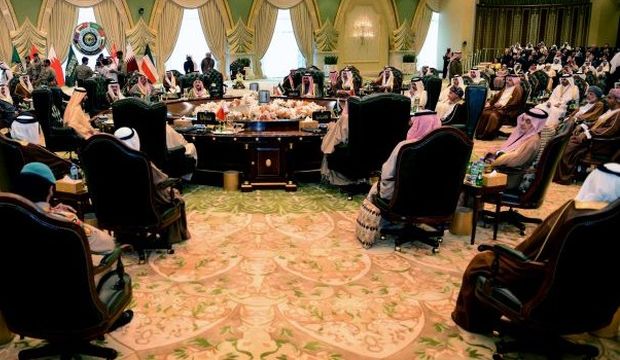The Gulf has not experienced times as difficult as the ones we are currently living through today. In addition to the unprecedented tensions in the region, changes in foreign policies that were previously solid and clear, and the apathy of the most powerful country in the world, there is also now the current dispute between the Gulf’s Arab states adding fuel to the fire.
Vigilance in dangerous times is a necessity, especially now that there is a consensus between Saudi Arabia, the UAE and Bahrain that their sister state Qatar is not, in reality, ready to change its policies, ones which have greatly harmed these three countries. After countless meetings and talks, ministers traveling to and fro between this capital and that, and committees observing, recording and submitting their reports, the final decision on the crisis remains with these three countries who have been extremely patient with Doha, to such an extent that it would not be prudent to bet on their remaining so any longer.
It is clear that the Gulf states can no longer tolerate Doha’s often rebellious policies toward its neighbors. What is also clear is that Qatar can no longer do anything to gloss over its mistakes in this regard. Nor can it dismiss a number of thorny issues related to certain groups and its relationships with them. Would Qatar one day be able to turn around to Hezbollah, the Houthis, the Muslim Brotherhood and others of their ilk and say, “Thank you for your help . . . but we’ve decided to end our relationship with you now,” suddenly cutting off its ties with all those who use it as a launching pad to harm its neighbors, while at the same Doha protects them and offers them sanctuary?
It is worth reminding ourselves that, despite hopes that Qatar would take steps to resolve the dispute with its neighbors, it was only one day after the meeting between the Emir of Qatar, Sheikh Tamim Bin Hamad Bin Khalifa, and the Custodian of the Two Holy Mosques, King Abdullah Bin Abdulaziz, that a new director-general was appointed at Al-Jazeera, one known for his unambiguously confrontational and inflammatory positions toward Saudi Arabia, the UAE and Bahrain. What message, then, was Doha hoping to send when it made this move? And what kind of reconciliation could possibly occur when it continues to pursue these “brotherly” policies with its “siblings”? Notice we are here talking about open and public decisions. We haven’t yet touched upon the kind of decisions that are made away from public view.
The sheer magnitude of Qatar’s mistakes is no secret to people in the Gulf. Their countries have tolerated Doha for years in the hope that it would return to the Gulf fold. Alas, its unruliness has now gone beyond even that, adopting an irritating and harmful set of policies, policies aimed unambiguously against its neighbors. And when confronted with bundles of evidence amassed by those neighbors to prove the truth of their positions, Doha simply replied that no one should interfere in its foreign policy or try to direct it, that nations are not measured by their size but by their ambitions. Doha believes that even if its policies are harmful to its neighbors, those neighbors still do not have the right to interfere in “sovereign matters.” Our Qatari brothers forget that none of the 28 member states of the EU are allowed to go against the general policies of the organization—the crisis over Ukraine is a case in point.
There is no doubt that Doha wants to prove that its policies will neither affect its membership of the Gulf Cooperation Council nor its relations with its neighbors. And it will use all the means at its disposal to get the message across to both its own citizens and across the Arab world and beyond, that it is staying the course it has been traveling—no matter what the cost. As for the rest of the Gulf, they will also stay their own course, one they have been on for the last 18 years, patiently tolerating Doha’s policies.
No one in the Gulf wants to lose Qatar, no one wants it to isolate itself, and no one wants—and this is more dangerous—for Qatar to enter into alliances with other countries such as Iran. The question is, however: is this what Qatar wants?

Trackbacks/Pingbacks